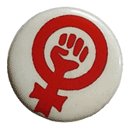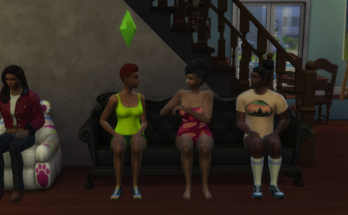For their second assignment in the class Online Feminist Spaces, my students conducted an ethnography of their site, and then posted their brief findings on this blog. They then read each others’ work, commented on it, and concluded by reflecting on the whole process. These reflections follow.
What seems notable to me, watching the whole thing online, is my students’ findings and conversations about:
- the critical importance of overt politics for feminist and anti-racist online presence
- the critical importance for controlled conversations
- the critical importance of spaces outside of capital
- the shared belief that safety is important and probably not totally available
I am also impressed by the care and attention that they pay to each other, and their respondents (that they practice that they preach above) and so, I see from their work that modeling and building the kinds of environments and experiences that we believe to be feminist and anti-racist is a critical part of the project.
While reading the work of my classmates, I became particularly grateful for the openly political platform of my site. This platform allows for open discussions within a controlled environment, because it is political there must be rules in place to disallow trolling. Other sites, particularly the Experience Project, would benefit greatly from more regulated interactions. The Tumblr site regulates interactions differently by allowing more user controls; you choose who to follow and who to allow access to your page. The ethnographies of the more corporate/consumerist sites reinforced my gratitude in the political nature of IVAW, they highlight the pinkwashing that can occur when a site is geared towards females, but not feminist. (Alejandra Rishton)
Through my research and the examination of my peers work I have learned that the research process is transformative. You must be always willing to adapt to the environment of your observations. Also, it is personally transformative because it pushes you to re-envision social phenomenon through a different lens, exposing different lived realities. (Leo Flores)
I believe that in comparison to the spaces that my peers chose to occupy for this project that Tumblr CAN be a safe space for feminist of color, although not all corners of Tumblr are safe for feminists of color. I do believe that Tumblr allows more freedom than some of the chat devices and forums that my classmates occupied because of the ability to create a sort of bubble and decide which material you choose to allow into your space. (Zoe Greco)
Reading about Emily Ann’s ethnography, I definitely felt like Soshified is an anti-racist space and a potential feminist space. All the members of Soshified may not agree with criticism that perspectives of feminism puts on for K-Pop girl groups, but the users are able to continue and exchange sane and inoffensive conversations while expressing their opinions. The users of Soshified may not identify themselves as feminists (it is a very one dimensional definition of feminism, but Soshified users mainly see feminists nothing more than a group of people who fight for women’s equal rights), their ability to respect others in a civilized manner without trolling makes them potential feminists. (Hyemin Lee)
Although the internet reflects the lack of a post-racial society and the use of the female body as a tool for commercialism, ACParadise’s focus on the creation of costumes with little focus on “for profit” commodification (I say “little because some commercialism is present on the site) allows for a movement away from racialized, antifeminist topics of discussion and community-building. (Gina Magnuson)
Cindy’s post made me think about the power of a site having an agenda or distinct purpose in thinking of my site because it worked on hers but it certainly does not work on the Experience Project. I think the key difference is Tumblr’s capacity to filter and be selective of community members and EP does not. However, it’s hard to say if that difference is bad or good because while it fosters a safe space, it can also lead to a lack healthy dissent in a community. (Daniela Meza)
In reading the ethnographies, it becomes more clear to me how much Omegle differs from the rest of them; it is an ever flowing, open chat room, not a forum or blog. You can only connect to one other user at a time, and cannot participate in conversation with multiple people. This fact I feel prohibits the space, but also maybe makes it safer because, as Hyemin pointed out, one does have the ability to leave the conversation at any time. (Emily Ann Morton)
After reading everyone’s ethnography, I appreciate the conversation and community on my website. “Friends” on my site were more than willing to help and do the questionnaire, which I believe was best for my ethnography. I applaud the classmates that were able to enter the site and start conversations about feminist and anti-racism, however, I had to take myself out from that and present as a student with a study.
(Chelsea Durgin)
Our collective experience in online spaces has shown me that the Internet is an unpredictable place; it can be a very scary and aggressive, warm and welcoming, or apathetic and indifferent to ideas on feminism or race, and sometimes it takes a great deal of time and effort to find the place you can most easily and comfortably yet productively fit. (Cassidy Cavanah)
In order for a online website/forum/blog to be(come) a safe feminist and anti-racist space, a lot of it has to do with the creators intentions with for the site as well as the moderators. If the moderators or creators of the site do not take agency in making their site a safe space, it usually becomes the opposite. (Cindy Donis)
I find that in reading and doing ethnographic research for media studies, the ethnographers have a much more nuanced and theory driven experience than when I did work in sociology, where rules and limitations in regard to the ethnographers positionality to their subjects clouds the research and makes for a more academic and less-personable piece of writing. (Casi Martinez)
Due to the anonymous nature of the internet, problematic comments, posts and content run rampant throughout the web. Through my research and what I have learned from the research preformed by others in the class, I have come to the conclusion that productive discourse on sensitive topics such as race, feminism and sexuality is difficult to achieve online. Depending on who your followers are and who you follow some productive conversations are possible, but they are difficult to maintain due to the anonymous and unofficial nature of the internet. (Hannah Adelstein)
Although ExperienceProject and Cosmopolitan are two sites that are non-feminist/racist spaces,
readers are made to believe that these sites are feminist/non-racist through the sites’ inclusions of particular words and forums, such as, “I Use the F* (Feminist) Word Campaign,” (Cosmopolitan) and “I Am A Feminist” (ExperienceProject), that, to readers, unconsciously function as a way to drop their “feminist safety net” and, as a result, get blindly sucked into the non-feminist/racist content the site is perpetuating.(Giselle Fierro)
After reading about other online spaces and spending time on LittleMonsters.com, it has become clear to me that a completely safe space online is hard to find, and LittleMonsters.com presents as a space where users feel safe, but in fact are subject to systems of communicative capitalism and narrow visions of equality and acceptance that privileges whiteness and hetero/homonormativity. (Charlotte Pradie)

